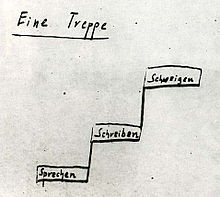Waste book
Appearance

A waste book was one of the books traditionally used in bookkeeping. It comprised a daily diary of all transactions in chronological order.[1] It differs from a daybook in that only a single waste book is kept, rather than a separate daybook for each of several categories. The waste book was intended for temporary use only; the information needed to be transcribed into a journal in order to begin to balance one's accounts.[2] The name of the book derives from the fact that, once its information was transferred to the journal, the waste book was unneeded.[3]
The use of the waste book has declined with the advent of double-entry accounting.
See also
References
- ^ "Books". American edition of the British encyclopedia. Vol. 2. 1819.
- ^ Pearce-Moses, Richard. "Waste book". A Glossary of Archival and Records Terminology.
- ^ Geijsbeek, John Bart (1914). Ancient double-entry bookkeeping: Lucas Pacioli's treatise. J. B. Geijsbeek. p. 137.
waste book+bookkeeping.
